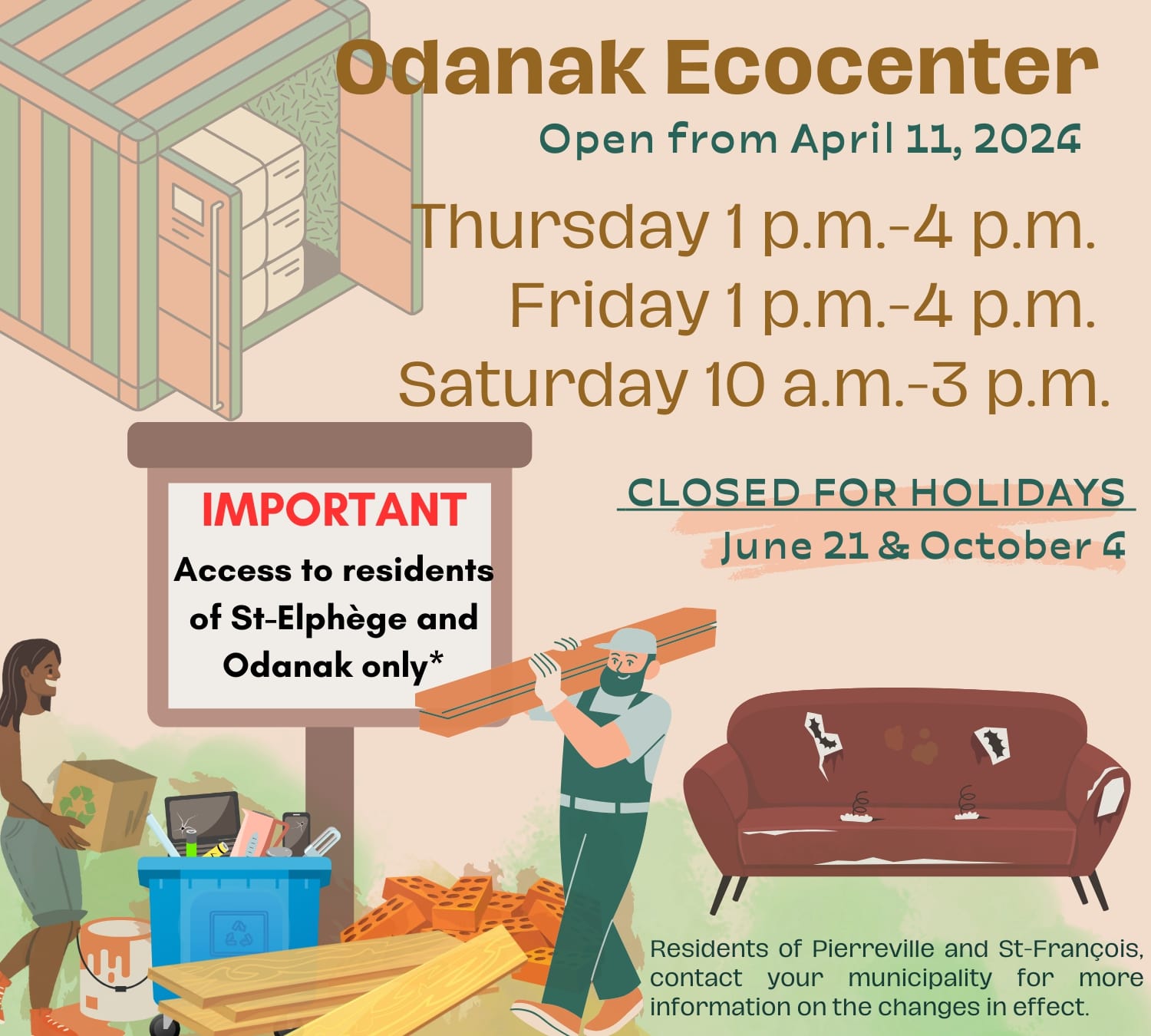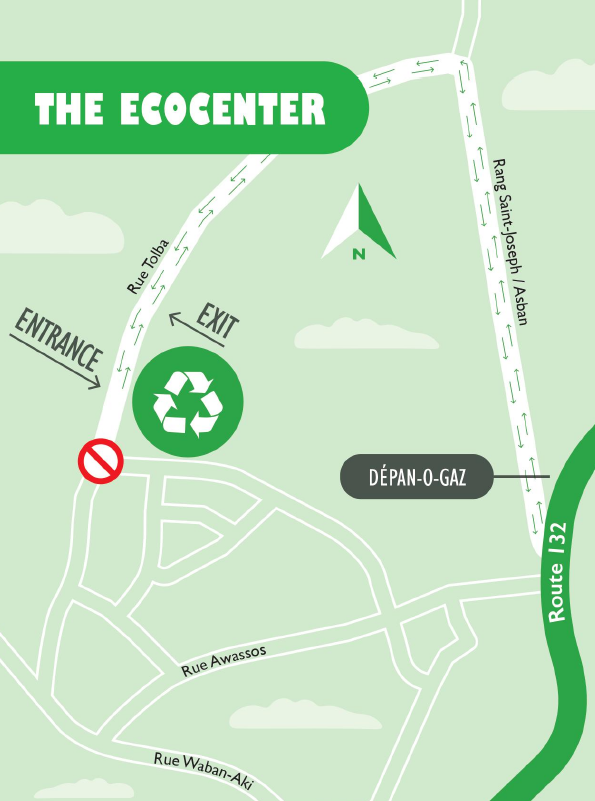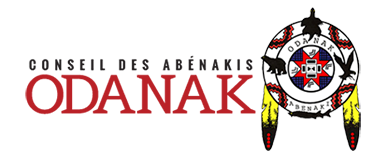

The ecocenter is located at 2035 Tolba Street, Odanak, J0G 1H0.
Using a GPS could take you down the wrong path, so follow these instructions.
On Route 132 take the junction of Asban Street (Saint-Joseph Row) which is on the left after Market 132 when heading east or right, 100 m after Dépan-O-Gaz Nimôwon when heading west. On Asban Street, continue 800 m and turn left on Tolba Street. The entrance to the ecocenter is at the end of the new segment of Tolba Street.
The use of the itinerary illustrated and described above is applicable and mandatory for all users.
ATALIKW8ZAKAMEK
Consult the information leaflet
USER REGULATIONS
- The use of the Odanak ecocenter is reserved to residents of Saint-Elphège and Odanak.
- It is forbidden to use the ecocenter outside opening hours.
- Users must immobilize their vehicle at the reception desk and identify themselves with the help of a official document with address.
- Users make their own unloadings, in the order in which they arrived and/or as directed by the employee.
- It is prohibited to use machinery or a tipping trailer to carry out unloading into containers.
- It is forbidden to detach the guardrail from and get into the container.
- Hazardous products of an industrial nature are not accepted at the ecocenter and the products accepted must be brought into their original container or in a container with a capacity of 20 litres (five gallons) or less.
- It is forbidden to smoke on the site under any circumstances.
- The speed limit on site is 10 km/h.
- Young children and animals must stay inside the vehicles.
- No hunting on the site.
Terms and conditions concerning residents of Saint-Elphège
- Limit quantity equivalent to a box of pick-up, 3 times per week.
- Plant residues deposits are authorized.
- Samples of granular material are not allowed for residents of municipalities.
NOTE: Institutions, businesses, industries and entrepreneurs are not allowed to use the ecocenter.
Some exceptions are eligible for a waiver to be discussed in advance with the ecocenter manager or with the CAO’s senior management.
Examples requiring a written waiver or agreement
- Third parties (persons or companies) transporting materials on behalf of a resident of Odanak or one of the municipalities (e. g. 1-800-GOT-JUNK)
- Municipalities
- Odanak residents with special needs
To contact the ecocenter: 873-255-5068. For special needs: contact Stéphanie Harnois at 450-494-2424.
LIST OF ACCEPTED MATERIALS
Accepted hazardous products must be brought in their original container or in a properly identified container with a capacity of 20 litres or less (five gallons). Hazardous products of an industrial nature are not accepted.
Accepted products: paint, oils, propane tanks (small and big), other hazardous products (toxic, oxidizers, fuels, oxidizers, acids, bases), aerosol products, ampoules, fluorescents, batteries and accumulators;
For the complete list, consult pdf
The following electronic products are accepted in unlimited quantities, but must not have been cannibalized or dismantled under any circumstances.
E.g. Television, recorder, cell phone, tablet, computer, electronic wiring, speakers, audio system, etc. For the complete list, consult pdf
All eyeglass frames, with or without corrective lenses.
Mattress, sofa, sofa, sofa, futon cushion
Furniture and objects in good condition for reuse, household and other products that have never been opened. Clothing in good condition must be sent to a charity that can receive it; it will not be accepted at the ecocenter.
Types of tires accepted: Car, van with a diameter less than 48″.
The tires brought must be whole, not cut.
Oversized tires, tracks, ATV, truck, loader, carpet and other rubber items are not accepted, but the Odanak Environment and Land Office can provide you with contacts to help you get rid of them.
Gypsum, glass, mineral wool, shingles, lint, mixed materials, plastic and some oversized items (bath, shower, furniture, pool cover);
Construction / demolition / painted wood, wooden furniture, melamine covered wood, chipboard, compressed wood, plywood.
There may still be nails or a little metal on the wood.
Scrap metal, tools, household appliances, anything that is more than 50% metal.
Refrigerators, air conditioners, freezers, dehumidifiers, electric coolers, etc.
Metals (ferrous and non-ferrous; without quantity limits)
Submit separately:
– Sand;
– Gravel (0-3/4″)
– Stones (1″-12″)
– Stones (12″ and more)
– Ceramic concrete brick
– Asphalt
Garden waste, grass clippings, branches, stumps, soil, excavation product, etc.
– All hazardous materials and products from industrial, commercial or institutional activities ;
– Weapons and ammunition;
– Picric acid (used in the manufacture of explosives);
– Hydrofluoric acid (used for the treatment and cleaning of metal surfaces, aluminium production, polishing/engraving/matifying glass, ceramics and silicon, manufacturing rustproof detergents for clothing)
– Asbestos in any form;
– PCBs (polychlorinated biphenyl) and any products that may contain them (used as insulating liquids in electrical transformers and capacitors, as heat exchangers and in various other specialized applications until the late 1970s);
– Creosote-treated or tarred wood (wood containing tar such as a telephone pole or railway sleeper);
– Cyanide in all its forms (use in chemistry and mining processes)
– Biomedical waste (syringes, catheters, animal carcasses);
– Pathological waste and radioactive waste;
– Household waste;
– Contaminated soil (e.g., fuel);
– Thorium nitrate (old incandescent sleeve, some TIG welding electrodes)
– Clothing (in good or bad condition);
– Some complex items such as whirlpools (jacuzzi) and structures not separated by material (e. g. a whole shed).
– Invasive exotic plants, such as Japanese knotweed and phragmites.
